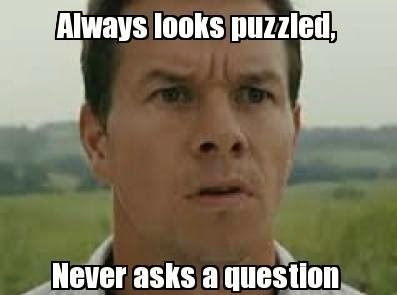
When you played DW or another AW game for the first time what did you find the most different? This could be something positive, negative, jarring or eye-opening. For me it was the lack of combat rounds. I can’t tell you how much time I kept looking for something in the book on them.
I had read about the fiction determining when moves took place, but it sure took a while for me to get it.

The absence of stake-based conflict resolution and a formal scene framing mechanic. It took me more than I’ll ever admit to play without those.
GM moves…”you mean, I don’t have to fudge dice rolls anymore to make cool stuff happen?”
It became much more of a conversation than it had been in any other RPG for me. Hardest part was freezing up once or twice when trying to make up 7-9 results on the fly. Second hardest was wrapping my head around how to handle NPCs and pets.
The idea of “player moves” being “triggered by the fiction”, and the set of player moves (what counts as a move, and what doesn’t) being somewhat arbitrary rather than systematic in its coverage.
Yeah, I think GM moves, especially where the easy choice is deal damage. I’m still working on it, but I’m much more aware of it now.
Yeah knowing when your PCs are doing a move is definitly something you have to get used to. And of couse making interesting choices when they get 7-9 its a great system for the players but it can be hard work for the GM to come up with a good one.
For me what was surprising was how much “more” gaming we were getting in. The story being told during a single session of Dungeon World would take at least 3-5 sessions in more “traditional” games.
Although things like combat grind and round-robin turns slow games down I suddenly became aware of how much time I, as the GM, had been wasting with other games rolling dice, consulting stat blocks and tables, and reading through pages of notes. The DW paradigm has allowed our group to do so much more gaming in our allocated time frame then I ever would have thought possible.
I was startled by how poorly my D&D 4E players took to the game in general, mostly due to them feeling a lack of agency and reliability in the outcomes of their actions.
DW relies so much more on creative trust, shared expectations, and communication than “modern” D&D (3e/4e/even “next’). As a GM, it felt like being unshackled. But my existing players baulked.
I ended up with a new group, with players that never really liked 3e/4e, and now things sing.
My biggest issue was keeping combat interesting. In PF, there is a monster with infinite HP and AC on a board. It was challenging enough for the players to worry about positioning, spell/action choice, and the bad guy’s attacks. In DW, you have to build compelling scenes/sequences. Once that clicked (probably the second session), battles were much more interesting, and players were much more invested. Also, everyone doesn’t automatically get a turn in DW, so you have to really make sure as a DM to pose dangers/opportunities to the less overt players.
Definitely GM moves. The story suddenly exploded!
The way that failed rolls really make the game by making the GM do some moves. You didn’t just fail your role to hack and slash you also made sure the necromancer got closer to summoning that horrible Dark Lord!
james day yeah, that’s still strange to me, even with my heavy storygames background. I think it’s the very trad fiction-first design of most of the game – I intuitively expect triggered moves to only affect the immediate fiction that triggered the move.
But the game is definitely stronger for it.